| Srl | Item |
| 1 |
ID:
020077


|
|
|
|
|
| Publication |
Aug 2001.
|
| Description |
387-398
|
| Summary/Abstract |
The common view is that China is North Korea's ally. The two countries share a similar political system and considerable strategic interest in regional international relations. Indeed, this is true to a large extent. This paper, however, analyses the problems in the bilateral relations that are gradually eroding the strategic ties the two countries formed 50 years ago. Its central argument is that, in reality, beneath the surface of the alliance relations the two countries share very few common interests. In fact, the two countries can hardly agree to any matters between them, be it historical ties, ideological stance, political and economic programs, or diplomatic interactions. This heralds an uncertain future for the bilateral relations and thus may further complicate the security situation in the Korean Peninsula.
|
|
|
|
|
|
|
|
|
|
|
|
|
|
|
|
| 2 |
ID:
143779
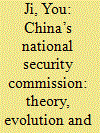

|
|
|
|
|
| Summary/Abstract |
The establishment of the National Security Commission (NSC) of the Chinese Communist Party (CCP) is a major regrouping of the top CCP power structure, a ‘New Deal’ in Xi Jinping’s endeavor to revitalize China. In full operation it will reshape Beijing’s national security (NS) decision-making process concerning the formulation of national security strategies, crisis management at home and abroad, coordination of national security policies and actions by Party/army/state agencies and institutional links with its foreign national security counterparts. This article argues that the NSC will primarily address the Party’s internal security concerns, which is the key link to its efforts to strike a new balance between various security typologies. It analyses Beijing’s securitization guidance and practice and constructs its organizational structure and functions.
|
|
|
|
|
|
|
|
|
|
|
|
|
|
|
|
| 3 |
ID:
051480
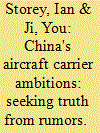

|
|
|
| 4 |
ID:
072887
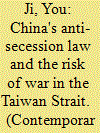

|
|
|
|
|
| Publication |
2006.
|
| Summary/Abstract |
The product of a ten-year debate, China's Anti-Secession Law assures Taiwan and the world that peaceful independence is a myth. The law explains that China is building military superiority to prevent Taiwan's de jure independence. This threat is matched by peace inducements, mainly economic integration, to increase the cost of independence. The ASL channels hard and soft approaches into one legal framework. Yet to this author, the ASL is fundamentally not a piece of law but a statement of Hu Jintao's new thinking. It enriches China's Taiwan policy of maintaining peace through the threat of war, the final line of defence against de jure Taiwanese independence. This article explains how the status quo is used against independence and how deliberate ambiguity has enlarged Beijing's space of manoeuvring with both Taipei and Washington. Beijing does not want war, but it must insist on its likelihood. The absence of a reunification timetable in the ASL shows that Beijing is not in a hurry to resolve the Taiwan issue. Beijing also has encouraged Washington to play a more active role in coordinating the cross-Strait interaction. The likelihood of war can best be reduced by building ambiguity into the cross-Strait relationship to avoid pressure for drastic action.
|
|
|
|
|
|
|
|
|
|
|
|
|
|
|
|
| 5 |
ID:
071555
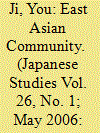

|
|
|
| 6 |
ID:
176601


|
|
|
|
|
| Summary/Abstract |
All supreme CCP leaders encounter an inherent contradiction between maintaining a necessary level of power sharing (collective leadership) while ensuring their own effective control over overall Party politics. This article uses case studies of the formation of the Eighteenth and the Nineteenth Central Military Commissions, as well as of the Nineteenth Politburo Standing Committee, to decipher how Xi Jinping has handled the contradiction by establishing his personal domination while attaining a degree of subtle grouping balance in the CCP/PLA leadership.
|
|
|
|
|
|
|
|
|
|
|
|
|
|
|
|
| 7 |
ID:
177630


|
|
|
|
|
| Summary/Abstract |
Chinese scholars have cordially insisted on the tangible economic benefits of the Belt and Road Initiative (BRI). However, their counterparts outside China mostly focus on BRI's revisionist outcome. This dichotomy in the BRI study testifies to a security dilemma embedded in the geostrategic tug-of-war between China and the United States. The U.S. Indo-Pacific Strategy (IPS) openly postulates a "pushback" of the BRI, which further highlights China's potent vulnerability in BRI expansion along with the critical choke points in both global waterways and through continental masses. As the BRI's military geography overlaps its geostrategic reach, the military factor is relevant. This article holds that it is plausible to assess the likely BRI geostrategic effects with the instruments of international relations theories, such as geopolitics. This article evaluates the BRI's well-being from a military standpoint that reflects the great power rivalry. The BRI's inherent military-security ramifications contribute to the restructuring of the existing geopolitical order across the Eurasian continents. A major security challenge for the BRI is the IPS's security/defense connectivity that may point to a new pattern of coordinated military balancing against China in general and its BRI expansion in particular. The People's Liberation Army (PLA) will be logically tasked to protect the BRI through capability enhancement and overseas presence.
|
|
|
|
|
|
|
|
|
|
|
|
|
|
|
|
| 8 |
ID:
128272
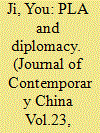

|
|
|
|
|
| Publication |
2014.
|
| Summary/Abstract |
The PLA's role in Beijing's foreign policy-making process is a closed book but it is a key research topic in our study of Chinese diplomacy. This paper argues that generally the PLA abides by a fine division of labor with the Ministry of Foreign Affairs (MoFA) in managing Beijing's international pursuits. The civilians are in charge of China's generic foreign affairs and daily diplomacy. The Central Military Commission (CMC) is responsible for security/military-related foreign affairs and defines the bottom-line for employing force in conflicts. Institutionally the PLA's role is more directional than detailed and is often behind the scenes. This complicates our research of the subject matter, as the line between this division of labor is thin over many diplomatic issues. Often times it is hard to demarcate where Beijing's normal diplomacy ends and where security/military dynamics begin. This paper adopts a two-layered analysis on civil-military interaction on foreign and security affairs: the broad consensus of CCP-PLA leaders on CCP regime stability at a time of drastic domestic change and world pressure; and the PLA's directional role in China's security/military-related foreign affairs under a generic civilian guidance.
|
|
|
|
|
|
|
|
|
|
|
|
|
|
|
|
| 9 |
ID:
154158


|
|
|
|
|
| Summary/Abstract |
This article assesses the role of the People's Liberation Army (PLA) in China's maritime affairs. A proper comprehension of Beijing's civil–military South China Sea strategy and the PLA's contribution to the formulation of this strategy is essential to a better understanding of Chinese President Xi Jinping's readjustment of China's South China Sea policy and China's assertive behaviour. This article argues that the PLA has been prominent both in policymaking at the top and in the first-line enforcement of Chinese maritime rights. At the macro level, the PLA's institutional authority is pivotal in overseeing the country's national security/defence-related foreign affairs. To Beijing and especially to the PLA, the South China Sea issue is regarded less as diplomatic and even territorial disputes, but more as national and military security disputes in the wake of US naval entry into the 12-nautical mile territorial sea of the China-held islands. The onus of dispute management now falls heavily on the PLA, and PLA centrality in the South China Sea affairs can be attributed to Xi's close ties with the PLA and his assertive leadership that gains firm support from the PLA.
|
|
|
|
|
|
|
|
|
|
|
|
|
|
|
|